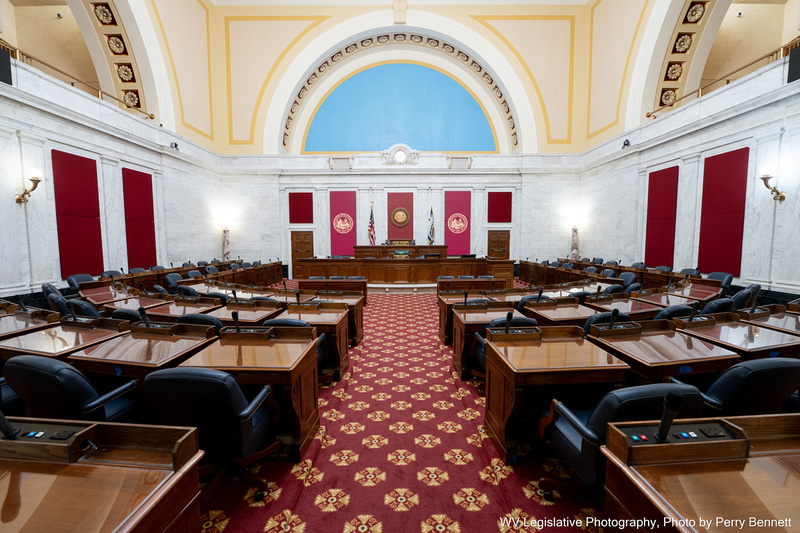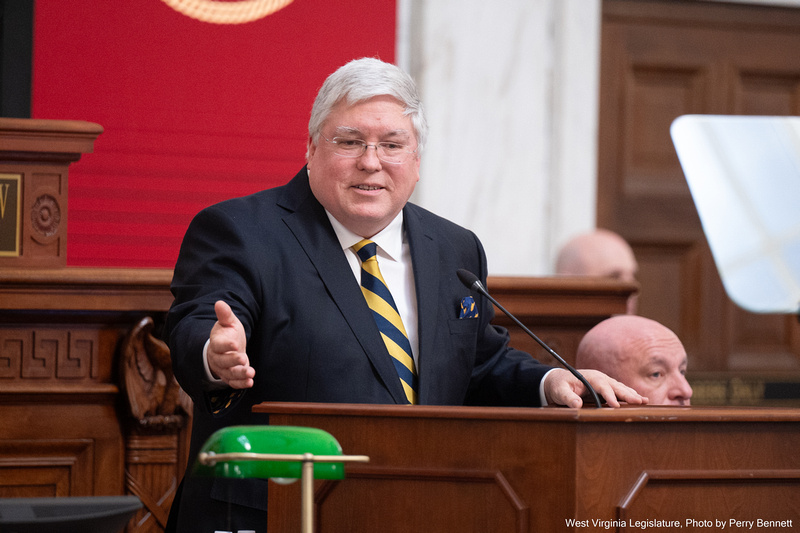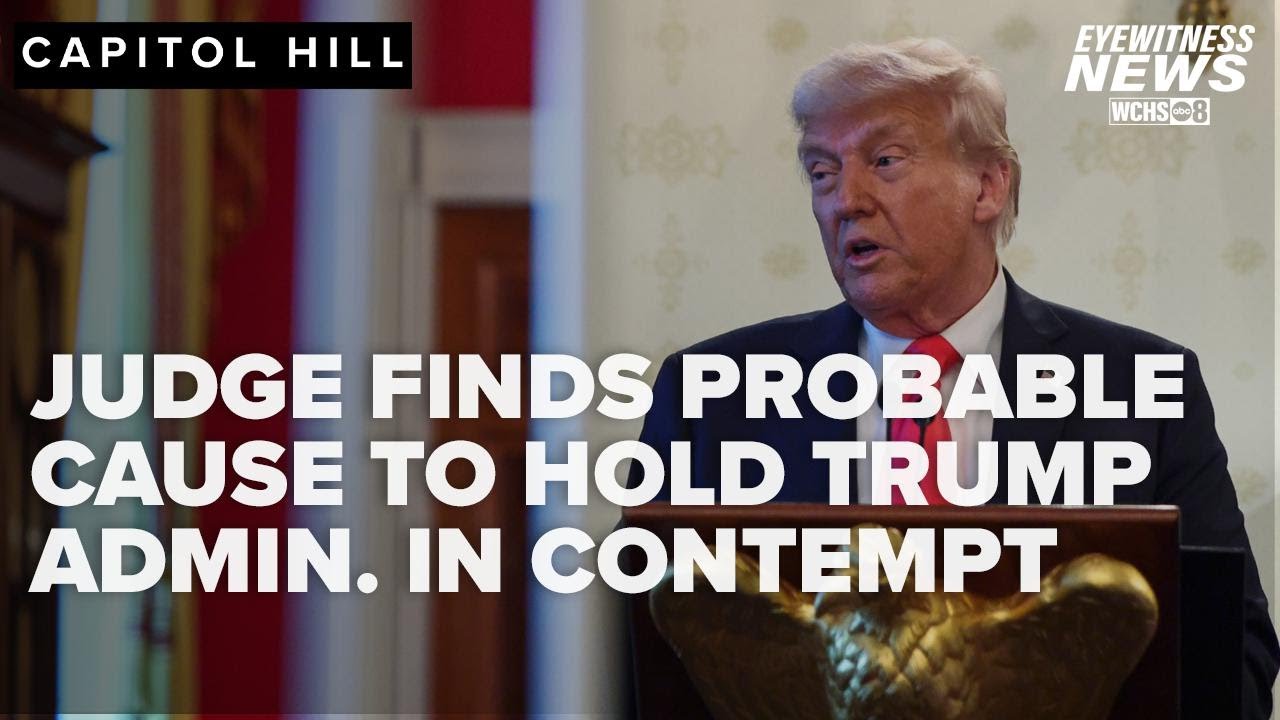News from the South - West Virginia News Feed
WV Republicans, who won nearly every election in 2024, focused on ‘election integrity’ this session

WV Republicans, who won nearly every election in 2024, focused on ‘election integrity’ this session
by Amelia Ferrell Knisely and Lori Kersey, West Virginia Watch
March 18, 2025
In the wake of West Virginia Republicans winning nearly every election in November, the GOP supermajority has spent a bulk of the 2025 legislative session on bills they say will increase election integrity.
Democratic lawmakers argue that conspiracy theories are guiding the onslaught of election bills this session.
There have been 93 elections- or voting-focused bills introduced this legislative session, and Republican-backed measures meant to clean up the voter rolls, restrict immigrants’ voting rights, make judicial races partisan and more have dominated committee agendas. The Senate already signed off on a measure that would clarify voter eligibility, including that a voter be a U.S. and state citizen; it also seeks to protect elderly residents’ voting rights.
A bill that would limit absentee voter registration has drawn concern from several outside groups, including the Women League of Voters of West Virginia, who say it targets elderly and disabled West Virginians in a state with abysmal voter turnout.
“West Virginia faces real problems … we suggest that you solve some of these problems before wasting your time chasing down bogus conspiracy theories that marinate in right-wing social media and cable news,” the group said in a statement.
West Virginia had no reports of election fraud during the 2024 general election, where the voters overwhelmingly favored President Donald Trump, and Republican candidates won nearly every race in the state, even adding on to their GOP majority in the Legislature.
“With so many Republicans in the Legislature, do they think those elections were fixed or rigged? Because that’s the legislation they’re running,” said Del. Shawn Fluharty, D-Ohio.
Sen. Mike Oliverio, R-Monongalia, said a non-election year is the right time for lawmakers to focus on making sure elections are safe and thwarting potential problems. Lawmakers can look to other states for ideas, he said.
“It gives us an opportunity to really look at election laws, evaluate what happened during the last election cycle, and try to identify what we can do to make the process better, safer and stomp out any fraud,” he said. “There’s no conspiracy here. Republicans are not trying to make it more difficult to vote.”
Several of the bills have come at the request of new Secretary of State Kris Warner, who has said that protecting the integrity of the election process was a priority.
“The names of deceased people, convicted felons and out of state citizens will continue to be removed from the voter rolls,” Warner told reporters during the West Virginia Press Association’s Legislative Lookahead event last month. “This session I’ll support the implementation of photo ID for voters and work tirelessly to ensure every eligible citizen will have the right and opportunity to vote.”
West Virginia Republican Party Co-Chairman Tony Hodge, whose work includes increasing voter turnout, said that Republican lawmakers aren’t trying to make it harder to vote.
“I think all West Virginians would agree that our elections should be as secure as possible,” he said. “It just gives peace of mind.”
Bill restricting absentee voter applications draws concerns
One of the more contested bills has been Republican-sponsored House Bill 2117, which would change how the state handles absentee ballots, including setting a deadline of 7:30 p.m. on Election Day for absentee ballots to be received and prohibiting people from sending absentee ballot applications to people who did not ask for them.
Trump has attacked the use of mail-in ballots, blaming his 2020 presidential loss on the voting method, though he more recently has walked back his criticism.
West Virginia allows absentee voting only in certain situations, like when residents are not present in the county during voting or they have another allowed excuse such as sickness or incarceration.
The legislation, which passed the House 88-14 on March 6, has drawn opposition from groups including the West Virginia Citizen Action Group, who say the bill penalizes people who rely on the U.S. Postal Service to send their absentee ballot.
“HB 2117 disregards West Virginia’s strong election safeguards, pushing baseless conspiracy nonsense that wastes time and ignores real issues,” Julie Archer, CAG’s deputy director, said in the statement. “Instead of solving problems, it attacks voters and makes it harder for eligible West Virginians to cast their ballots.”
“Supporters pointed to restrictive voting laws in other states to justify the bill — laws born from the same baseless hysteria over voter fraud that this legislature seems hell-bent on keeping alive,” she said.
Del. Rick Hillenbrand, R-Hampshire, one of the bill’s sponsors, said he wanted to prevent groups from sending large amounts of absentee ballot applications to people who may not be eligible by law to vote by absentee ballot.
“This has actually occurred in the past where some groups have without vetting whom they’re sending applications to, whether or not they’re legally eligible to vote by absentee,” he said. “They just mass mail absentee ballot applications. The problem with that, of course, there are people who are perhaps a little too trusting with regards to things that get sent to them and delivered, especially by organizations they believe to be reputable.”
Del. Evan Hansen, D-Monongalia, says the bill could unfairly restrict voters in nursing homes who rely on absentee voting. West Virginia is one of the nation’s most elderly states.
“I’m concerned that federal law requires nursing home workers to help their residents vote,” Hansen said.
Individuals who mail or deliver more than 10 applications for an absentee ballot would face a $500 fine or incarceration for a misdemeanor, according to the bill. It prompted Hansen to send an absentee ballot application to every House member to show “this email would be illegal.”
“Hopefully that made the point with them how ridiculous this bill is,” he said. “They fear absentee voting, so they want to make it more difficult to cast a vote.”
In a statement, the League of Women Voters of West Virginia called the legislation voter suppression. The bill awaits consideration in the Senate.
“Absentee voting is essential for West Virginians with disabilities, those who lack transportation, the elderly, and residents of rural areas,” the group said in a statement. “These are demographics that characterize much of West Virginia’s potential voting population.
“Our state is known for its poor broadband penetration. This bill targets vulnerable West Virginians least likely to have computers and direct internet access who might otherwise access absentee applications on their own.”
One election bill awaits Morrisey’s signature
Sen. Jack Woodrum, R-Summers, sponsored a bill that would prohibit rank choice voting, which isn’t happening in the state. The measure, which passed the House and Senate, is awaiting approval from Gov. Patrick Morrisey. It’s one of 13 bills that have made it to the governor’s desk at the halfway point in session.
Woodrum said that many of the election bills this year have been guided by public interest.
“Pretty much every public meeting I’m in, the thought of election fraud and people that have lost faith in the ability of the government to run a fair election comes up,” he said.
Both Woodrum and Hillenbrand said the state generally does well at running elections, but improvements can be made.
“Our secretary of state’s current and immediate past worked very hard to try to tighten it up. So I think all in all, we’re in a good place,” Hillenbrand said. “But like most things in life, there’s always a little room for improvement.”
In the House, Del. J.B. Akers, chair of its Judiciary Committee, said the Republican Caucus has prioritized election security bills.
“Even though the Republicans won most of the races in the last election cycle by significant margins most of the time, they are acknowledging that voters do want secured elections and that these election bills are something that’s going to apply across the board, regardless of who’s in power,” said Akers, R-Kanawha.
The House Judiciary Committee is still vetting proposed voter photo ID changes, and House Bill 3016, sponsored by a Republican lawmaker, would do away with most of those forms of identification accepted, narrowing it down to six options: driver’s license, state ID, passport, employee ID, student ID and military ID. The state’s chapter of the American Civil Liberties Union opposes the bill.
While those bills are moving, Hansen is still waiting for his Republican colleagues to take up his bill that seeks to modernize the state’s elections by updating absentee ballot procedure as making it more difficult to challenge a signature match.
YOU MAKE OUR WORK POSSIBLE.
West Virginia Watch is part of States Newsroom, a nonprofit news network supported by grants and a coalition of donors as a 501c(3) public charity. West Virginia Watch maintains editorial independence. Contact Editor Leann Ray for questions: info@westvirginiawatch.com.
The post WV Republicans, who won nearly every election in 2024, focused on ‘election integrity’ this session appeared first on westvirginiawatch.com
News from the South - West Virginia News Feed
Morrisey’s line-item budget vetoes slash funds for vulnerable children during foster care crisis

by Amelia Ferrell Knisely, West Virginia Watch
April 18, 2025
Gov. Patrick Morrisey signed the budget bill Thursday night, but not before slashing millions of dollars in funding through his line-item veto power. The Republican governor’s cuts were wide sweeping across state programs, and services for vulnerable children were among those surprisingly hit.
“When I took office, I inherited a $400 million structural budget gap in the upcoming fiscal year, which would grow to nearly $600 million in the years ahead if it was not immediately addressed,” Morrisey said in a statement released by his office. “The fiscally conservative budget I signed tonight makes progress tackling structural gaps and begins to place us on a pathway toward financial stability in the future.”
The 29 separate line-item vetoes included slashes in funding for roads, school safety and tourism projects. There were also millions of dollars in cuts to programs that serve foster kids, families impacted by substance abuse and sick children.
Morrisey cut $250,000 in funding for Lily’s Place, a nonprofit organization in Cabell County that provides treatment for newborns with neonatal abstinence syndrome and support for families dealing with substance use disorder. West Virginia has the highest rate nationally of infants born with neonatal abstinence syndrome amid the state’s ongoing substance abuse crisis.
House Finance Chairman Vernon Criss, R-Wood, called it “the most insulting” of Morrisey’s line-item vetoes.
“This one should be right at the top — to be able to take newborns that are drug-afflicted and be able to help them,” Criss said. “[It] seems to have a very high success rate of helping newborns getting off the drug situation.”
Morrisey also decreased funding for the Ronald McDonald House in Morgantown and In-Home Family Education, a parent and child support program in West Virginia.
“It’s almost like you’re picking on kids who can’t speak up for themselves,” said House Minority Leader Sean Hornbuckle, D-Cabell.
The legislative session adjourned with little action on the state’s abundant foster care issues despite bills introduced to address a myriad of problems, including too many foster children living in hotels.
Lawmakers wanted to give $1.1 million in state funding to West Virginia’s Court Appointed Special Advocates, or CASA, a program that helps foster children in the court system.
Morrisey cut 75% of that funding in his line-item veto. His office did not respond to an email from West Virginia Watch seeking information about the funding decrease. In his veto message, the governor said the program relies on grants and could seek additional grant funding.
Shanna Gray, executive director of West Virginia CASA, said she was grateful to the Legislature for creating a dedicated line item for the program.
“We could not be more appreciative of our state lawmakers for prioritizing support for children in foster care,” she said. “Albeit significantly reduced, the governor‘s final allocation of $300,000 establishes a crucial foundation of state support. We remain optimistic about this initial investment and thankful for the state’s recognition of CASA’s essential role in ensuring children’s best interests are represented and heard.”
In total, Morrisey cut $800,000 in foster care funding.
“The fear is that we’ve got programs out there right now that we do not know if they’ll be able to continue because the federal dollars are going to dry up,” Criss said. “[Morrisey] needs to be able to take a very hard look at all the programs.”
In a news release on Friday, the West Virginia Democratic Party called on the governor to “reconsider these harmful decisions and focus state resources on supporting vulnerable citizens and vital community programs.”
Disagreement among GOP supermajority about budget
The Republican-led House and Senate passed their $5.3 billion general revenue budget bill last week.
Morrisey’s line-item veto messages used similar language often, saying, “it is imperative that a cautious and prudent approach be taken” while citing concerns about future uncertainties, like the federal stock market fluctuations and federal uncertainty. He also said that there are “ongoing budget challenges.”
The spending vetoes also included $500,000 reduction to Mountwood Park in Wood County for Jeep trails, and a $187,000 reduction to the more than $11 million allocation to the state Veterans Nursing home, and a $250,000 cut for a nursing education program.
“He decided nursing programs are not where he wants to spend money,” Criss said.
There was a $25 million reduction to the State Road Fund; Criss said that funding cuts may damage the state Division of Highways’ ability to draw down federal funds for projects.
Morrisey eliminated $250,000 allocated for the West Virginia University College of Law but did not touch the $1.5 million lawmakers gave the university to build a civics learning center overseen by a political appointee. Lawmakers passed a bill mandating the center, but it hasn’t yet been signed by the governor.
He slashed more than $110 million approved in three surplus funds, which included the funding for Lily’s Place. Morrisey said those funds may be needed for anticipated gaps in Medicaid, Public Employees Insurance Agency and federal changes.
Morrisey is a staunch supporter of President Donald Trump; Hornbuckle said the governor’s decision to slash state spending because concerns about Medicaid and federal changes showed, “Even the governor doesn’t believe his good friend is going to be able to help West Virginians.”
“We might have to fill back in dollars to Medicaid or PEIA,” Hornbuckle continued. “People need to be really paying attention to what’s going on there, and he doesn’t trust the Trump administration.”
Hornbuckle added that Morrisey’s line-item vetoes showed disagreement among the state’s GOP-supermajority in power.
Criss continues to refute Morrisey’s projected $400 million structural deficit.
“I am the last finance chairman still in place from the previous administration, I take that a personal cut,” he said. “[Morrisey] doesn’t understand how we have been budgeting and doing the budget process for the last seven years when we’ve tried to keep our ‘operating portion’ of our budget.” The House wanted the state to have surplus money in the back of the budget that could be used for one-time projects.
Senate Finance Chairman Jason Barrett, R-Berkeley, wasn’t available for comment.
Funds slashed for safe schools, educational programs
Morrisey’s line-item vetoes included several education-related projects, including funding decreasing to the Mountain State Digital Literacy Program, a math education program and computer science education. In a veto of $200,000 in funding for Safe Schools, Morrisey said it is, “imperative that we limit new spending.”
West Virginia’s public schools can’t afford to implement millions of dollars in safety upgrades, including secure front entries and weapon detection systems. There are more than $200 million in school safety requests in need of funding.
“How can we in good faith cut money to safe schools and that is something that goes to all of our public education when we are pumping millions of dollars into the Hope voucher program?” Hornbuckle said.
The budget passed by the Republican-led Legislature opted to put away about $33.6 million from general revenue to the state Personal Income Tax Reserve Fund. That money, Criss said, can be allocated by the Legislature at any time. The fund has more than $500 million in it, drawing frustration from Del. Kayla Young, D-Kanawha, during budget debate since other programs had gone unfunded.
The budget didn’t include $100,000 for clean drinking water in Wyoming County. Funding was cut for the state’s Jobs and Hope Program.
Hornbuckle voted against the budget when it passed the House, citing concerns about a lack of funding for child care.
“I didn’t think it had a lot of fiscal logic and appropriate the dollars that we do have to public education or child care,” he said. “I’m also confused why we went further down the hole right now in making the current cuts that we did.”
In a statement on Thursday, Morrisey said that “much work remains in the next fiscal year to address budget shortfalls.”
“ … I applaud the Legislature for sending me a budget that closely resembles my original proposal and begins to address long term issues while funding West Virginia priorities,” he said.
YOU MAKE OUR WORK POSSIBLE.
West Virginia Watch is part of States Newsroom, a nonprofit news network supported by grants and a coalition of donors as a 501c(3) public charity. West Virginia Watch maintains editorial independence. Contact Editor Leann Ray for questions: info@westvirginiawatch.com.
The post Morrisey’s line-item budget vetoes slash funds for vulnerable children during foster care crisis appeared first on westvirginiawatch.com
News from the South - West Virginia News Feed
Federal judge finds probable cause for contempt against Trump administration in deportation case

SUMMARY: A federal judge found probable cause for contempt against the Trump administration over the deportation of Kilar Armando Abrego Garcia, despite a Supreme Court ruling ordering his return. The Department of Justice called it an “administrative error,” while Attorney General Pam Bondi insisted he would not be returned. Senator Chris Van Hollen criticized the administration, demanding accountability for violating due process. A New York Times investigation revealed most deported migrants had no significant criminal background, fueling concerns about potential overreach by the Trump administration. Democrats warn that such actions threaten democratic principles.

A federal judge has determined there is probable cause to hold Trump administration officials in criminal contempt for defying orders to halt deportations under the Alien Enemies Act.
#federalgovernment #federaljudge #nationalnews #trumpadministration #kilmarabregogarcia #immigration #immigrants #breakingnews
_________________________________________
For the latest local and national news, visit our website: https://wchstv.com/
Sign up for our newsletter: https://wchstv.com/sign-up
Follow WCHS-TV on social media:
Facebook: https://www.facebook.com/eyewitnessnewscharleston/
Twitter: https://twitter.com/wchs8fox11
Instagram: https://www.instagram.com/wchs8fox11/
News from the South - West Virginia News Feed
West Virginia’s Gauley River among the nation’s most endangered, conservation organization says

by Lori Kersey, West Virginia Watch
April 16, 2025
West Virginia’s Gauley River has been named to a conservation organization’s list of the most endangered rivers in the country this year.
The river is 10th on the list of America’s Most Endangered Rivers for 2025. The river is threatened by coal mining pollution in one of its tributaries, the Cherry River, according to the organization.
Each year, American Rivers sets the list of rivers that face a major decision that the public can influence. The list is based on the significance of the river to people and wildlife, and the magnitude of the threat.
The West Virginia Highlands Conservancy and Appalachian Voices is suing the South Fork Coal Company, which operates more than 3,000 acres of surface mines in Greenbrier and Pocahontas counties outside the Monongahela National Forest, over alleged violations of the Clean Water Act and Surface Mining Control and Reclamation Act.
The mines have violated water pollution standards at least 80 documented times since 2019, releasing sediment and toxic heavy metals into the river, according to a news release.
The groups have challenged the U.S. Forest Service decision to grant the company access to use a national forest road as a haul road without complying with environmental protection laws. The company was first granted access to the road in 2013 based on an application that falsely claimed it did not cross into the forest, said Olivia Miller, program director for the West Virginia Highlands Conservancy. The access was renewed in 2018 and 2023.
The company has been permitted to operate the Rocky Run Surface Mine, the mine at the center of the lawsuits over pollution, since 2021.
The road was temporarily shut down, but reopened after the company appealed to the Department of Interior, Miller said.
The environmental groups’ lawsuits have been stayed after the coal company filed for chapter 11 bankruptcy in February.
“We’re waiting to see what happens with the bankruptcy proceedings. So this could be tied up in court for years, and meanwhile, they are still hauling coal,” Miller said.
The Office of Surface Mining, Reclamation and and Enforcement (OSMRE) has a public comment period underway now about the coal company’s request for a valid existing rights determination to continue using the road. Mining activity in the national forest is prohibited, exempt for a few exemptions.
“For four years, this company has illegally operated within the Monongahela National Forest,” Willie Dodson, coal impacts program manager at Appalachian Voices said in a news release. “Now, having just declared bankruptcy, South Fork Coal is asking regulators to retroactively validate this activity. It’s unacceptable. If they get away with it, I shudder to think what the next encroachment by the coal industry into our public land will be. Are they going to strip Spruce Knob? Are they going to put a sludge dam at Cranberry Glades? This is the time to draw a line in the sand.”
Miller said the river being added to the endangered list will help alert policy makers and the public of the river’s plight.
“The Gauley’s listing specifically will hopefully draw national attention to ongoing problems that we’re seeing with this company and encourage the public and policymakers to step up before any more irreversible harm occurs in this sensitive area,” Miller said.
“We are asking OSMRE to deny the after-the-fact request that the company can continue using this road,” Miller said. “So right now, we need as much public comment as possible to pressure the OSMRE to deny their valid existing rights request.”
A representative of South Fork Coal Company could not immediately be reached for comment.
The Gauley River draws tens of thousands of white water rafters each year for its world class rapids. The river and its tributaries are also popular fishing destinations. Miller said pollution puts the river’s recreation opportunities at risk.
“The outcome of this valid existing rights determination will reverberate far beyond West Virginia, and I think will really set a precedent for better or for worse on mining and public lands,” Miller said. “And I really don’t believe that the people of West Virginia want to see the Monongahela National Forest impacted or mined. As somebody who grew up in the Mon in Tucker County, that would be just completely devastating and earth shattering for me to see happen in my lifetime.
“So now is the time for people to come together and protect our outdoor recreation economy and activities like rafting, fishing and hiking, hunting that people from West Virginia love, and these are activities that thrive on clean, healthy ecosystems,” Miller said.
The Gauley River listing comes days after President Donald Trump signed a series of executive orders meant to bolster the nation’s struggling coal industry. The orders allow some older coal-fired power plants set for retirement to keep operating and directs federal agencies to lift barriers to coal mining and prioritize coal leasing on U.S. lands.
“Coal is the dirtiest of fossil fuels,” Miller said. “Even though most of our state leaders would like to ignore climate change, we cannot ignore it any longer and this push to ‘bring back coal’ is only going to cause more pain and suffering for people in West Virginia and across the world,” she said. “And I think the recent executive orders really exemplifies the tension between efforts to bolster domestic coal production again and the need to protect public lands and water resources.”
GET THE MORNING HEADLINES.
West Virginia Watch is part of States Newsroom, a nonprofit news network supported by grants and a coalition of donors as a 501c(3) public charity. West Virginia Watch maintains editorial independence. Contact Editor Leann Ray for questions: info@westvirginiawatch.com.
The post West Virginia’s Gauley River among the nation’s most endangered, conservation organization says appeared first on westvirginiawatch.com
-

 Mississippi Today6 days ago
Mississippi Today6 days agoLawmakers used to fail passing a budget over policy disagreement. This year, they failed over childish bickering.
-

 Mississippi Today6 days ago
Mississippi Today6 days agoOn this day in 1873, La. courthouse scene of racial carnage
-

 Local News7 days ago
Local News7 days agoAG Fitch and Children’s Advocacy Centers of Mississippi Announce Statewide Protocol for Child Abuse Response
-

 Local News6 days ago
Local News6 days agoSouthern Miss Professor Inducted into U.S. Hydrographer Hall of Fame
-

 News from the South - Alabama News Feed4 days ago
News from the South - Alabama News Feed4 days agoFoley man wins Race to the Finish as Kyle Larson gets first win of 2025 Xfinity Series at Bristol
-

 News from the South - Alabama News Feed5 days ago
News from the South - Alabama News Feed5 days agoFederal appeals court upholds ruling against Alabama panhandling laws
-

 Our Mississippi Home7 days ago
Our Mississippi Home7 days agoFood Chain Drama | Our Mississippi Home
-

 News from the South - North Carolina News Feed7 days ago
News from the South - North Carolina News Feed7 days agoHelene: Renewed focus on health of North Carolina streams | North Carolina











































